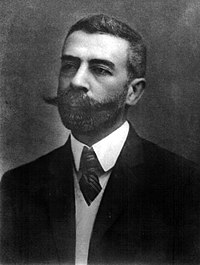Joaquín V. González
| Joaquín Víctor González | |
|---|---|
 |
|
|
Argentine Senator for La Rioja Province |
|
|
In office 1916–1923 |
|
| Rector of the University of La Plata | |
|
In office 1906–1918 |
|
| Preceded by | Dardo Rocha |
| Succeeded by | Rodolfo Rivarola |
| Minister of Justice and Public Instruction | |
|
In office 1901 – 1906 |
|
| President |
Julio Roca Manuel Quintana |
| Preceded by | Juan Serú |
| Succeeded by | Federico Pinedo |
| Governor of La Rioja Province | |
|
In office June 24, 1889 – October 8, 1891 |
|
| Preceded by | Antonio García |
| Succeeded by | Dermidio Carreño |
| Personal details | |
| Born | March 6, 1863 Nonogasta, La Rioja Province (Argentina) |
| Died | December 21, 1923 (aged 60) Buenos Aires |
| Political party | National Autonomist Party |
| Spouse(s) | Amalia Luno Olmos |
| Occupation | Journalist and academic |
Joaquín Víctor González (March 6, 1863 – December 21, 1923) was an Argentine educator, political scientist, writer, magistrate, and politician.
González was born in Nonogasta, a rural community near Chilecito, La Rioja Province, to Zoraida Dávila and Joaquín González. He enrolled at the Colegio de Monserrat, a college preparatory school in Córdoba, and in 1881 entered the labor force as a journalist. He worked for a number of local journals in subsequent years, including El Interior, El Progreso, and La Revista de Córdoba, and taught History, Geography, and French language at the local normal school. He became an active Freemason.
González earned a juris doctor at the University of Córdoba in 1886, and returned to La Rioja Province, for which he served as counsel in a territorial dispute with Córdoba Province. Later that year, he was elected to the Lower House of Congress, a post to which he would be re-elected three times, serving until 1901.
As Congressman, he was appointed to the Commission for Constitutional Reform in 1887, and subsequently drafted the Provincial Constitution of La Rioja. He published his first work, La Revolución de la Independencia Argentina, and joined La Prensa, at the time one of the leading news dailies of Buenos Aires.
He taught Mining Law at the University of Buenos Aires, and in 1889 married the former Amalia Luna Olmos; they had five children. He was elected Governor of La Rioja that year, and during his tenure, wrote La Tradición nacional (1891), a study of regionalisms and their basis in geography and history. Returning to Buenos Aires, he was made a tenured professor of Mining Law, a member of the board of the University of Buenos Aires School of Philosophy and Letters, and, in 1896, a member of the National Educational Council.
...
Wikipedia
